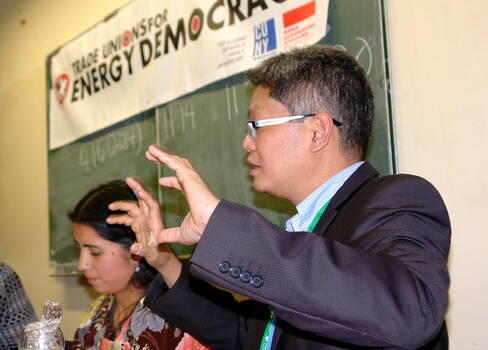
December 5 2015 | 4:30 - 6:30 pm | "Peoples' Climate Summit" Montreuil | Lycée Jean Jaurès |1 Rue Dombaske, 93100 Montreuil | salle 400
Most people probably do not automatically relate austerity policies to global warming, or social protests to climate protection. The Trade Unions for Energy Democracy (TUED), however, as an international network, strives to change this, by providing a link between workers' resistance to austerity measures and to the slashing of social services and the global struggle against climate change. In the face of the current crisis, the organisation provides a clear answer: the targeted re-appropriation and democratisation of energy production and distribution. The event during the People's Climate Summit in Montreuil explored the experiences to date of unions from different global regions, and then asked what kind of agenda would take equal account of social, environmental and economic concerns. At the centre stood the demand for a just transition, whereby workers, and in particular those employed in fossil fuel-related sectors, do not fall victim to, but instead become actively involved in, the necessary changes. Privatisations, the slashing of services and declining investments in the public infrastructure hinder such a transition because the prescribed austerity measures stand in the way of the spending required for a socially just ecological transition.
The failure of previous COPs - symptomatic of a power imbalance
Asbjørn Wahl from Fagforbundet, the Norwegian Union of Municipal and General Employees, began his talk by pointing out the incessant increase of CO2 emissions since the start of the COP process. He concluded that it was highly doubtful that the ongoing negotiations in Paris would alter this general trend. Wahl interpreted the simultaneous and visible escalation of austerity measures as a 'class war from above'. He classified the meagre results in the struggle against climate change as a strategic challenge for unions and social movements: their strength in this struggle needs to increase and they need to resist the project of those in power and pit the defence of collective interests from below against them. More and more, the struggles against austerity measures and the causes of climate change are becoming hard to disentangle, as ultimately climate change is set to become the number one job killer, with disastrous economic and social consequences.
Defining the requirements of democratic systems of energy production and supply
Overall, participants agreed on the logical next step: the demand for a (re-)appropriation of the systems of energy production and supply and other public sectors. Energy democracy, this was the consensus, is a suitable political project for a broad coalition of different social movements, in which the unions, too, should be a key player. Lyda Fernanda Forero from the Transnational Institute emphasised people's right to resist a profit and growth-oriented system as a first step in the struggle against climate change. From this perspective, it is vital to block free trade and investment agreements that grant corporations more power and rights. To the demand for public ownership and the democratic control of public goods, she added the question of the centralisation and necessary share of large-scale technical solutions that she argues require negotiations at the local level between consumers, workers and residents affected by these projects.
Alliances to counter austerity measures and repression
Wol-San Liem, a representative of the transport union KPTU from South Korea, reported on the state repression suffered by workers actively opposing privatisation policies. Faced with an economic crisis, South Korea's government has responded with a wave of reforms, which have subordinated labour rights, environmental legislation and safety standards to a pure logic of profit maximisation and led to the intensified selling-off of public companies and goods. Unions are increasingly coming under pressure, with several union members imprisoned after protests. Whilst South Korea has announced far-reaching emission cuts at the COP 21 and is presenting itself as an emissions-conscious nation, the country is speeding up the deregulation of its energy sector and promoting nuclear energy. However, South Korea omits to mention that the alleged emission cuts are actually an increase, at least compared with 2005 figures. The general secretary of Sentro from the Philippines, Josua Mata, added examples from the history of the privatisation of the energy sector in his country, which has suffered under the highest electricity prices in Asia ever since. With the support of the unions, communities are, however, defending their access to energy services and resisting disconnection in cases where people cannot afford to pay their bills. In alliances such as these, Mata sees an opportunity not only to regain control, but from a longer-term perspective to also begin the necessary transition to a sustainable system of energy production and supply.
Together for a good life for all
Alliances and strategies to link diverse social struggles also stood at the centre of the subsequent discussions with the numerous other participating union and civil society representatives. There were repeated calls for a broader approach that considers the future of society and opportunities for everybody to have a good life. To display their true potential, such ideas would have to be translated into political programmes and discussed in concrete terms. Participants wanted to maintain contact to continue discussing these ideas.